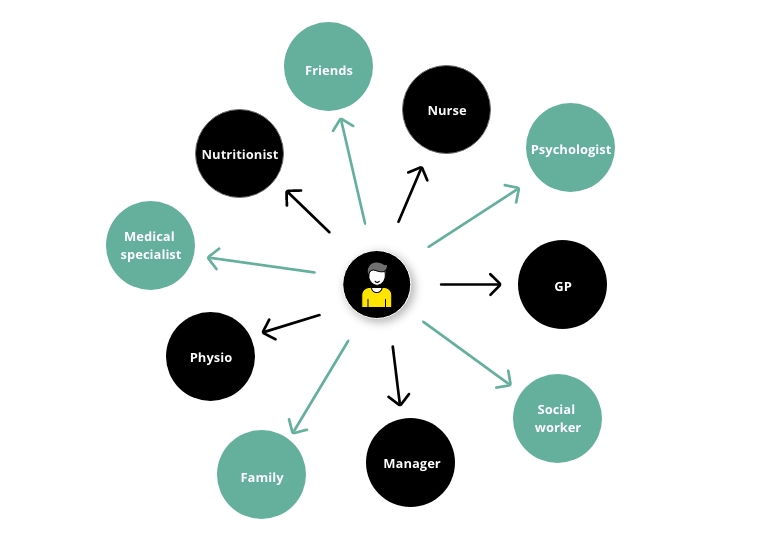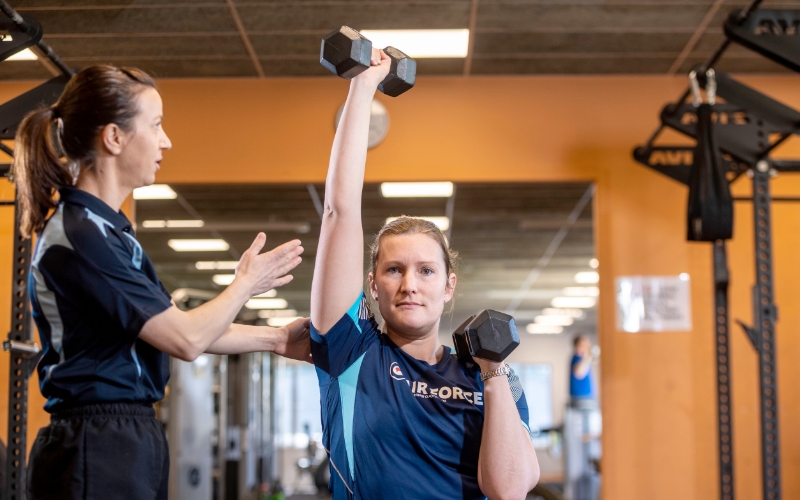Exercise Rehabilitation Instructor (ERI)
Kaiako Whakaoranga Mahi Tinana
An Exercise Rehabilitation Instructor (ERI) provide exercise based therapy to help rehabilitate service members back to health.
ERI role explained.
What is an ERI?
The Exercise Rehabilitation Instructor (ERI) is a military or civilian trained Physical Training Instructor (PTI) who has specialised in Exercise Rehabilitation. This role sits within the Military Medical Technician scope of practise, and requires annual credentialing to maintain currency in their role.
The ERI works within the Rehabilitation Management Team (Physiotherapist and Doctor) which is part of the wider health Multi-disciplinary Team (MDT) approach to managed care plans and treatment pathways in the delivery of overall care for NZDF service members.
The specific intent of exercise rehabilitation is to return personnel to operational levels of fitness and function as soon as possible. Where this is not achievable, the intent is to attain the maximum level of function, physical, psychological and social health.
Intergrated recovery

Rehabilitation is achieved through the collaborative and integrated approach to healthcare provided by the NZDF health providers working with the patient and sometimes their whānau.
Rehabilitation Management Team (RMT)
The Rehabilitation Management Team (RMT) often includes, but is not limited to, the medical practitioner, physiotherapist, nurse/medic and ERI. Their main focus is on the physical conditioning of the individual. Depending on the individual and severity of the injury, a Wider Health Multi-Disciplinary Team can be used to help in the process. This support could be extended to include social support providers - Social worker, Psychologist, Chaplain or manager.
Wider Health Multi-Disciplinary Team (MDT)
The Wider Multi-Disciplinary Team is a group of health care professionals of different disciplines, each providing specific services for the management of complex medical cases.
Support Team
The patient's manager is an important part of the rehabilitation process to ensure that their workplace understands the process, recovery time and any limitations that may be placed on their work ability. The RMT can provide guidance on the work outputs that won’t effect the recovery of the patient but can still contribute to the working environment.
At times, especially in complex cases, the patients family will be involved in injury working group meetings.
What is the Role of an ERI?
The role the ERI is to develop a rehabilitation training programme that incorporates exercises targeting the specific injury and working towards re-establishing full range of motion, strength, and functional ability and for the maintenance of cardio-vascular fitness and general musculoskeletal conditioning.
The ERI will organise weekly group therapy classes and individual training for their patients, specific to each injury, as well as regular progression and Return to Training tests. If improvement isn’t being made the ERI will consult with, or refer the patient back to physiotherapy to ensure recovery doesn’t plateau. All training adheres to the parameters set by the medical practitioner and physiotherapist when the patient is referred.
The ERI must ensure the treatment plan is documented and placed on the patients medical file.
Who can see an ERI?
Under their scope of practise, ERIs can only work with military personnel through referrals from a general practitioner or physiotherapist working for or contracted to the NZDF.
Being a trained PTI, ERIs can provide advice and support around injury prevention, exercise technique and recovery.
If the injury occurs during an activity supervised by the ERI, they can only apply first aid and direct them to the Health Centre or Physiotherapist.
How can an ERI help you?
Exercise Based Therapy
They can assist you in your recovery through specific training to rehabilitate the injured limb / body part, but also ensure the rest of your body maintains a level of fitness that can be achieved without disrupting the recovery of the injury.
Education and Advice
The ERI can provide advice around injury prevention, recovery and stretching techniques, as well and educational information that pertains to you and your specific military working environment.
Motivation and Support
ERI’s are aware of the impact that injuries can have on an individual both mentally and physically. They are there to provide support in this area with assistance from other health professionals where needed.
Communication to your Command Chain
ERIs, in conjunction with the Medical Officer and Physiotherapist, provide regular update to the patients command / manager to ensure their workplace has an understanding of the timeframe and/or any restrictions needed in work duties. This ensures a good line of communication as well as supporting the service person to return to full working duties as quick as possible.
